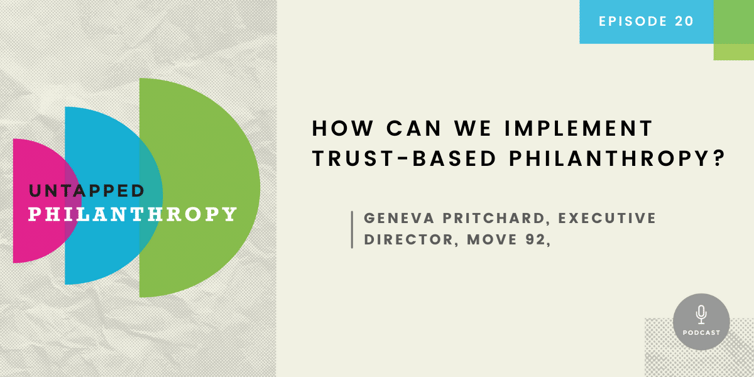
Step 1: Learn about trust-based philanthropy.
Step 2: Take a deep breath, trust, and IMPLEMENT these practices.
It really is that simple.
In May, we had the pleasure of interviewing the Executive Director of the Trust-Based Philanthropy Project, Shaady Salehi, for our Untapped Philanthropy podcast. Her organization educates philanthropists on the inherent power imbalances between foundations and nonprofits and offers funders information on how to update their funding process through six key steps.
This month’s podcast guest, Executive Director of Move 92, Geneva Pritchard, breaks down phase two — the practice of trust-based giving and how this movement has enabled communities worldwide to support themselves.
And yes, we have a habit of revisiting this topic on our podcast. At Fluxx, we've learned that our funders and the amazing grantmakers we work so closely with are hungry to learn more about this topic. They want action. They want to implement new tactics. And most importantly, we all the impact and empowerment that this giving style affords.
Untapped Philanthropy Season 2, Episode 8: How can we implement trust-based philanthropy?
“The Trust-Based Philanthropy Project is an incredible resource for learning about trust-based philanthropy. What are the barriers? What does it mean? What does it mean in a corporate setting? And if what you learn resonates with you, we can help you figure out how to get your money to grassroots organizations worldwide,” said Geneva.
Move 92 distributes grants directly to local community leaders already serving their people in brilliant ways. There is no diversion of funds. No giving goes to large international aid organizations (not to say that those organizations don’t do amazing work). Instead, it’s gifted directly to community organizations that deeply understand their community and cause and could make incredible things happen with consistent unrestricted support. Donors can fuel any number of incredible innovative projects worldwide — from supporting local farmers in Laos to building a safer internet for women in Indonesia to helping refugees in Athens — and trust their funds enable communities to create positive change for themselves.
On the surface, this all seems obvious. But many big aid organizations are weighed down by bureaucracy, cumbersome organization-wide reporting structures that are difficult to adjust, and more.
“One barrier is letting go of the concept that Western ideologies are more helpful, better, or needed. It's really powerful to bring local leaders to the table and listen, rather than just bring local leaders to the table only to offer outside perspectives. But it does mean bringing people to the table that have never had a seat at the table before. And giving them some extra space, because there's a lot we can learn. And there are many years of not listening,” said Geneva.
Western philanthropy is well established. The giving systems established in the U.S. and Europe date back several decades, and as Geneva shares, “it takes courage to question the nonprofit sector because it's built on altruism.” Our peers are committed to this industry because they are passionate about helping their fellow man. It’s natural many would be reticent to criticize a well-intentioned but outdated giving process. But funders (including many of our clients) and nonprofits are questioning these systems with the help of the Trust-Based Philanthropy Project and Move 92.
What do you think of trust-based philanthropy? What concerns or excites you about enabling communities with direct and unrestricted funds? We encourage you to share your thoughts with us on Twitter and join the conversation.
Catch up on last month’s episode of Untapped Philanthropy — Feminist movements are under attack. How can we help?— featuring a conversation between Fluxx co-founder, Kerrin Mitchell, and Bridgespan Group Partner and social activist, Debby Bielak, right from our blog or on your favorite podcast listening apps including Apple, Spotify, and Google.
Episodes of Untapped Philanthropy are released monthly and always shared on the Fluxx blog. We encourage you to subscribe to the Fluxx blog to stay up to date on new episode releases and follow us on social media for podcast excerpts and more!
Download the transcript here.